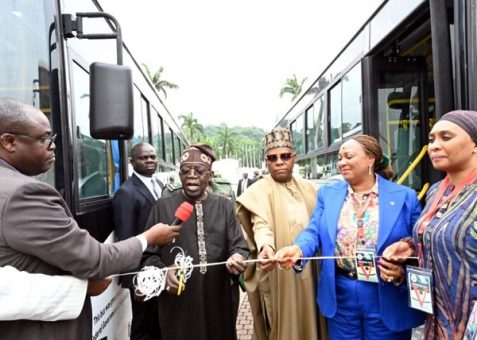The Federal Government’s initiative to introduce Compressed Natural Gas (CNG)-powered vehicles for public transportation gained significant momentum yesterday with the arrival of 90 high-capacity buses.
President Bola Ahmed Tinubu emphasized that adopting CNG buses is a crucial step toward enhancing the nation’s economy and reducing transportation costs.
The President personally received 30 of these buses at the Presidential Villa, while government representatives took delivery of the remaining 60 in Lagos.
Of the 20 buses received in Abuja, 10 were manufactured by the indigenous company Innoson Motors and were donated by the Depot and Petroleum Products Marketers Association of Nigeria (DAPPMAN).
The Nigerian National Petroleum Corporation Limited (NNPCL) Foundation provided the other 10.
The President officially inaugurated these vehicles during a ceremony at his office, where five of the buses were displayed.
President Tinubu noted that countries like India have mandated the use of CNG for all commercial vehicles since 2004. In Nigeria, where commercial vehicles account for about 80% of the nation’s petrol consumption, the introduction of CNG-powered transportation is seen as a significant solution to curbing the high cost of fuel.
He assured Nigerians that this move would lead to economic improvements and greater prosperity.
“It is a great inspiration for me to receive these buses on behalf of the government,” the President said. “Utilizing natural gas to power Nigeria’s transportation industry is the next logical step.”
The President further expressed his commitment to advancing innovative and productive ideas to maximize Nigeria’s natural gas resources. He acknowledged the transportation challenges faced by Nigerians and emphasized that the adoption of CNG buses would lead to transformative changes in the country’s energy sector, ultimately driving the nation’s prosperity.
President Tinubu also commended Innoson Motors and other contributors for their dedication to improving Nigeria’s transportation landscape.
Winifred Akpani, Chairman of DAPPMAN, highlighted that the buses were designed and manufactured by Innoson Motors, based in Nnewi, Anambra State. Each bus can accommodate 100 passengers and has the flexibility to run on diesel as an alternative fuel. Akpani assured the government of DAPPMAN’s continued support and commitment to alleviating the transportation challenges faced by Nigerians.
“These hybrid buses, capable of running on both CNG and diesel, are a testament to our commitment to easing the burdens on Nigerians,” Akpani said. She also mentioned that the initial pledge of 100 buses made last year is being fulfilled, with more donations expected in the future.
Emmanuella Arukwe, Managing Director of NNPCL Foundation, expressed her excitement about the company’s involvement in the project. She emphasized that the initiative aligns with the foundation’s focus on promoting clean energy and affordable transportation.
Arukwe pointed out that fueling CNG buses is more cost-effective than traditional fuels, which will help reduce transportation fares and benefit the economy.
Minister of Information and National Orientation, Mohammed Idris, stated that the introduction of these CNG buses marks a significant shift towards renewable energy, as promised by the Tinubu administration.
In Lagos, the government received hybrid CNG buses from Jet Motor Company. These vehicles, which can run on both CNG and petrol, were handed over during a ceremony at the company’s plant in Ajah.
The buses were received by officials from the Ministry of Finance and representatives of the Presidential Initiative for Compressed Natural Gas (P-CNGi).
Dimas Hamidu, Technical Assistant to the Permanent Secretary of the Ministry of Finance, commended Jet Motor Company for the quality of the vehicles and reiterated the government’s commitment to alleviating the impact of the fuel subsidy removal through the introduction of these CNG-powered buses.
The Managing Director of Jet Motor Company, Derek Ewelukwa, provided technical details about the hybrid vehicles, explaining that each bus is equipped with two CNG tanks, capable of holding a total of 220 liters of gas, allowing for a range of 300 kilometers.
The petrol tank has a capacity of 80 liters, and the engine can seamlessly switch between gas and petrol. Ewelukwa also mentioned that the CNG tanks have a lifespan of 15 years.
The government’s initiative to introduce CNG-powered buses is seen as a significant step towards reducing transportation costs, promoting clean energy, and boosting the economy, with more vehicles expected to be delivered in the near future.











